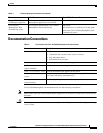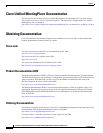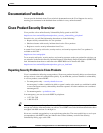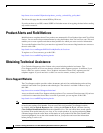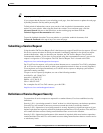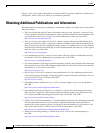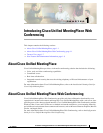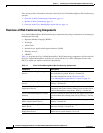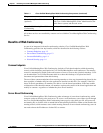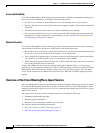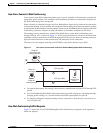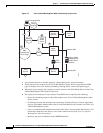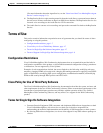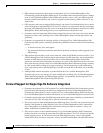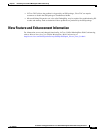
1-3
Installation and Upgrade Guide for Cisco Unified MeetingPlace Web Conferencing Release 6.x
OL-13418-01
Chapter 1 Introducing Cisco Unified MeetingPlace Web Conferencing
About Cisco Unified MeetingPlace Web Conferencing
All of these services are controlled by a master service called the Cisco MeetingPlace Web Conferencing
Service.
Benefits of Web Conferencing
As part of an integrated rich-media conferencing solution, Cisco Unified MeetingPlace Web
Conferencing provides four key benefits, which are described in the following sections:
• Common Endpoints, page 1-3
• Server-Based Conferencing, page 1-3
• Increased Reliability, page 1-4
• Network Security, page 1-4
Common Endpoints
Cisco Unified MeetingPlace Web Conferencing includes a Flash-based endpoint called the meeting
console, which facilitates participation in Cisco Unified MeetingPlace web conferences. The meeting
console is automatically loaded on the web browsers of users as soon as they join their meetings. Users
can download the Cisco Unified Presenter Add-in to share their desktop or to upload and share
documents and presentations from their desktop.
The use of these common endpoints allows meeting attendees to view any document being shared by the
host regardless of whether they have the applications installed on their PCs. For example, if the host
shares an Excel spreadsheet, all attendees are able to view the shared spreadsheet. If the host enables
collaboration of the shared document, all attendees can then take control of the shared application and
modify its contents—regardless of whether they have Excel installed.
Server-Based Conferencing
Cisco Unified MeetingPlace Web Conferencing takes advantage of server-based conferencing, which
connects each user directly to the web server. To access a web conference, users either sign in through
the Cisco Unified MeetingPlace Web Conferencing home page by using their user ID, user password,
and meeting ID, or click the click-to-attend link in their meeting notification. Either action launches the
meeting console, which connects users to their meeting. Because of server-based conferencing, users do
not need to know the IP addresses of other PCs to connect.
Cisco MeetingPlace Video Service
(optional)
Provides video conference integration by communicating
with Cisco Unified MeetingPlace Video Administration, the
Audio Server system, and the web server.
Cisco Unified MeetingPlace Web
Conferencing
Priority = Normal (8).
Table 1-1 Cisco Unified MeetingPlace Web Conferencing Components (continued)
Component Description



